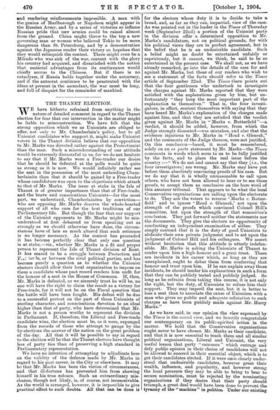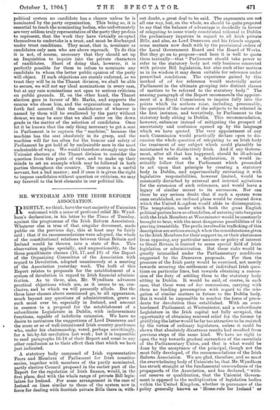W E have hitherto refrained from anything in the nature of
detailed comment in regard to the Thanet election for fear that our intervention in the matter might be liable to misconstruction. We have felt that the strong opposition which we as Unionists are obliged to offer, not only to Mr. Chamberlain's policy, but to all Unionist candidates who support it, might make Unionist voters in the Thanet division believe that our opposition to Mr. Marks was directed rather against the Protectionist than the man. Such a misunderstanding of our attitude would be extremely distasteful to us, for we do not hesitate to say that if Mr. Marks were a Free-trader our desire that he should be defeated at the polls would be quite as strong as it is now. We would infinitely rather see the seat in the possession of the most unbending Chain- berlainite than that it should be gained by a Free-trader whose candidature was open to the objections which attach to that of Mr. Marks. The issue at stake in the Isle of Thanet is of greater importance than that of Free-trade, and the brave and conscientious Unionists—for the most part, we understand, Chamberlainites by conviction— who are opposing Mr. Marks deserve the whole-hearted support of all who care for the best traditions of our Parliamentary life. But though the fear that our support of the Unionist opponents to Mr. Marks might be mis- understood at first debarred us from speaking out as strongly as we should otherwise have done, the circum- stances have of late so much altered that such reticence is no longer necessary. As the contest has proceeded it has become perfectly clear that only one question is at stake,—viz., whether Mr. Marks is a fit and proper person to represent the Isle of Thanet division of Kent. It has ceased to be a struggle between Protection and try le, or between the rival political parties, and has become purely a question as to whether the Unionist electors should allow their local organisation to impose on them a candidate whose past record renders him unfit for the honour of a seat in the House of Commons. If, then, Mr. Marks is defeated, as we sincerely trust he will be, no one will have the right to claim the result as a victory for Free-trade, for it will not be on the Fiscal question that the battle will have been fought. His defeat will be due to a successful protest on the part of those Unionists of sterling character, and conscientious devotion to an ideal higher than that of party, who have determined that Mr. Marks is not a person worthy to represent the division in Parliament. If, therefore, the Liberal and Free-trade candidate wins, the election must be, as it were, expunged from the records of those who attempt to gauge by the by-elections the answer of the nation on the great problem of the day. All that it will be possible to say in regard to the election will be that the Thanet electors have thought less of party ties than of preserving a high standard in Parliamentary representation.
We have no intention of attempting to adjudicate here on the validity of the defence made by Mr. Marks in regard to his past career, in the City or elsewhere. It may be that Mr. Marks has been the victim of circumstances, and that ill-fortune has prevented him from showing himself in his true colours. Such an extraordinary mis- chance, though not likely, is, of course, not inconceivable. As the world is arranged, however, it is impossible to give practical effect to such doubts. All that can be done is for the electors whose duty it is to decide to take a broad, and, as far as they can, impartial, view of the case. As was pointed out in the leader in the Times of Thursday week (September 22nd) a portion of the Unionist party in the division offer a determined opposition to Mr. Marks's candidature, not on political grounds, for with his political views they are in perfect agreement, but in the belief that he is an undesirable candidate. Such a belief might no doubt be entertained unfairly or capriciously, but it cannot, we think, be said to be so entertained in the present case. We shall not, as we have already remarked, go into the details of the case for and against Mr. Marks, but those of our readers who wish to see a statement of the facts should refer to the Times article of September 22nd. The Times there points out that the four gentlemen who undertook to investigate the charges against Mr. Marks reported that they were satisfied with the explanations given by him, but un- fortunately 'they keep the most important part of the explanation to themselves." That is, the four investi- gators, in effect, content themselves with saying that they have heard Mr. Marks's explanation of the charges made against him, and that they are satisfied that the verdict given against Mr. Marks in 'Marks v. Butterfield "—a verdict, it should be added, however, from which the Judge strongly dissented—was mistaken, and also that the evidence injurious to Mr. Marks in "Head v. Glenesk," and the comments of the Judge thereon, were not justified. On this conclusion—based, it must be remembered, solely on an ex parte statement by Mr. Marks—the Times comments in words which seem to us to be fully justified by the facts, and to place the real issue before the country :—" We do not and cannot say that they [i.e., the four investigators] are wrong. Mr. Marks may have put before them absolutely convincing proofs of his case. But we do say that it is wholly unreasonable to call upon others, who have not been allowed to hear or to see these proofs, to accept them as conclusive on the bare word of this amateur tribunal. That appears to be what the local Conservative organizations are calling upon the electorate to do. They ask the voters to reverse Marks v. Butter- field' and to ignore Head v. Glenesk,' not upon the strength of the proofs which convinced Colonel Hill's committee, but upon the strength of that committee's conclusion. They put forward neither the statements nor the documents. They give the electors no opportunity of conducting an independent examination of either. They simply contend that it is the duty of good Unionists to abdicate their own private judgment and to act upon the judgment of Colonel Hill and his colleagues. We assert without hesitation that this attitude is utterly indefen- sible. Mr. Marks is asking the Unionists of Thanet to confer upon him a high honour and a great trust. There are incidents in his career which, so long as they are unexplained, ought to debar them from conferring that honour and trust upon him. If he can explain away those incidents, he should tender his explanations in such a form that they can be publicly tested and publicly judged. So long as he refrains from taking this course, it is not only the right, but the duty, of Unionists to refuse him their support. They may imperil the seat, but it is better to lose a seat than to associate the cause of Unionism with a man who gives no public and adequate refutation to such charges as have been publicly made against Mr. Harry Marks."
As we have said, in our opinion the view expressed by the Times is the sound view, and we heartily congratulate our contemporary on its public-spirited action in the matter. We hold that the Conservative organisations ought never to have chosen Mr. Marks as their candidate, and that it is now essential to teach them and all similar political organisations, Liberal and Unionist, the very useful lesson that party " caucuses " which outrage and. defy public opinion in their choice of candidates will not be allowed to succeed in their essential object, which is to get their candidates elected. If it were once clearly under- stood that undesirable candidates, however great their wealth, influence, and popularity, and however strong the local pressure they may be able to bring to bear to secure nomination, must be rejected by the nominating organisations if they desire that their party should triumph, a great deal would have been done to prevent the tyranny of the " machine " in politics. Under our existing political system no candidate has a chance unless he is nominated by the party organisation. This being so, it is essential to teach the nominating bodies, who unfortunately are very seldom truly representative of the party they profess to represent, that the work they have virtually co-opted themselves to undertake is a trust, and must be discharged under trust conditions. They must, that is, nominate as candidates only men who are above reproach. To do this it is not, of course, necessary that they should set up an. Inquisition to inquire into the private characters of candidates. Short of doing that, however, it is perfectly possible for them to refuse to nominate any candidate to whom the better public opinion of the party will object. If such objections are sternly enforced, as we trust they will be in the Thanet division, we shall be able to secure, we will not say ideal nominations in every case, but at any rate nominations not open to serious criticism on public grounds. If, on the other hand, the Thanet election goes in favour of Mr. Marks, and supports the caucus who chose him, and the organisations can hence- forth feel assured that the candidature of whoever is named by them will be swallowed by the party without demur, we may be sure that we shall enter on the down grade in the matter of the selection of candidates. Once let it be known that the only thing necessary to get a seat in Parliament is to capture the "machine," because the machine has the seat absolutely in its grasp, and the machine will far too often for the honour and safety of Parliament be got hold of by undesirable men in the most undesirable of ways. We would therefore strongly urge the Unionist electors of the Thanet division to consider the question from this point of view, and to make up their minds to set an example which may be followed in both parties throughout the country. The caucus is a useful servant, but a bad master ; and if once it is given the right to impose candidates without question or criticism, we may say farewell to the best elements in our political life.























































 Previous page
Previous page